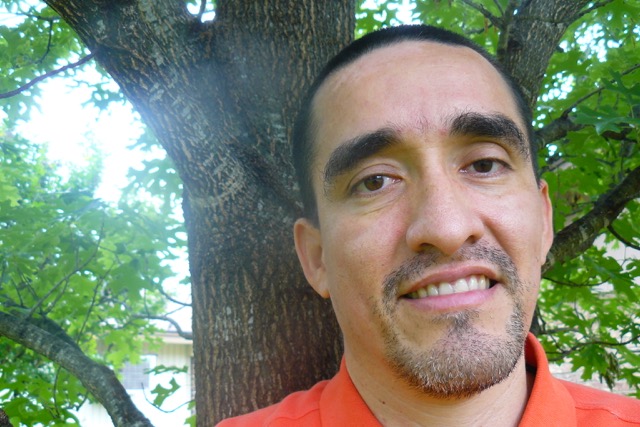González to Join CDSP as Assistant Professor of Old Testament

For some, biblical Hebrew is an impediment to studying the Old Testament. For Julián Andrés González Holguín, it was the main attraction.
“Back in my country, a pastor very dear to me said, ‘Julián, would you like to learn Hebrew?’” said González, a native of Colombia. “ He was and is a member of the society that is translating the Hebrew Bible into Spanish. I have always liked languages and learning languages. From there began the idea of doing something with the Hebrew Bible.”
Something life-changing, as it turns out.
González, who recently completed his Ph.D. with honors at the Perkins School of Theology at Southern Methodist University, will join CDSP’s faculty this summer as an assistant professor of Old Testament, a joint appointment with Pacific Lutheran Seminary.
“Julián offers a fresh new voice in the world of scholarship and teaching in the context of theological education,” said the Very Rev. W. Mark Richardson, CDSP’s dean and president, in announcing the appointment. “He is very integrative in his approach to studies in sacred texts, looking for contemporary analogies to the experience of God in the ancient Middle East.
“For example, he explores contemporary issues of immigration in light of Old Testament experiences of exodus and diaspora. It is a hermeneutic of lively immediacy that will bring new insight from scriptural studies.”
González’s research, publications and teaching have focused on how religious ideologies and Biblical narratives have been used to provoke and justify violence. He comes by his interest in violence through experience, he says.
“My country has been in violence since the late 1940s and early 1950s,” González says. “We have had guerilla groups since the 1950s. We haven’t been able to come to a peace agreement. Colombia is a country against itself. I have had experiences myself that have led to an interest in looking at the texts of violence in the Bible and how we interpret them, how we deal with them and how we use them nowadays.”
González has a bachelor’s degree in electronic engineering from Pontificia Universidad Javeriana in Cali, and worked for four years as a software developer at Shell, before entering Truett Seminary at Baylor University in 2006 where he and his wife, Viviana Urdaneta, earned master’s degrees in divinity. Urdaneta, who also earned a master’s degree in social work at Baylor, a therapist in Dallas, is president of Latinos Against Domestic violence and the organizer of the Madrinas, a program that trains indigenous leaders to support victims of abuse.
While at Baylor, the couple volunteered at First Baptist Church. “We were involved in ministry with migrant population, especially Mexican citizens,” González said. First Baptist is a primarily white church in a predominantly black and Hispanic neighborhood. “We were trying to be a bridge between both communities,” he said.
While at First Baptist, González developed HABLA (Hablando Alrededor de la Biblia con los Amigos – Speaking around the Bible with Friends), a program in which members of the local Hispanic community and church members met to share food and read the Bible together. Through common study, they came to understand better how their life experiences and cultural assumptions shaped their understanding of scripture.
“Most of those attending were migrants,” González said. “They were happy to express their own concerns and to see Biblical texts as a means to express their concerns. But if people are not part of these marginalized communities, but from communities that perhaps benefit from the violence in our society, their reception is different. They don’t want to read it that way. It raises issues that they don’t want to deal with. It has different reception depending on the circumstances on the audience.”
González said he was moved to apply for the faculty opening at CDSP in part because of the opportunity to teach in the diverse interfaith environment of the Graduate Theological Union, and in part by a sentence on the seminary’s website which says that CDSP “integrates scholarship, reflection and worship with the ministry of the Gospel of Jesus Christ.”
“That balance between reflection and preparation, that double emphasis is very important to me,” he said.
González is a member of the Hispanic Theological Initiative,
which was founded in 1996 to support Latino and Latina students and
faculty members in theological education. “In the Latino community,
there many identities” he said. “There is not a single lens. I think
what I can say as a Colombian is that I bring this concern about
violence, and as a migrant I understand the experience of being in a
place that is not yours and that is sometimes hostile but sometimes
welcoming.
“Coming out of that context, I think I see myself as encouraging and supporting a Latino voice that can contribute to the understanding of these issues of migration and fellowship with the other.”
While González knows little about the Bay Area, he has already seen enough to know that it speaks to him in one particular way.
“I love hiking,” he said. “I really love that. I miss mountains. In Colombia, I used to take my bike and the mountains were three blocks from my home. Here in Texas everything is flat. So I am looking forward to hiking again.”

